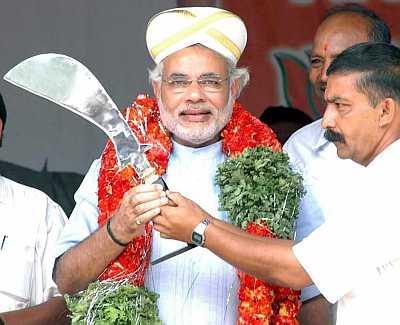Narendra Modi
| Narendra Modi | |
 |
Narendra Damodardas Modi (Devnagri: नरेन्द्र दामोदरदास मोदी, Gujarati: નરેન્દ્ર દામોદરદાસ મોદી [nəɾɛn̪d̪ɾə d̪ämod̪əɾd̪äs mod̪i]; born 17 September 1950[1]) is the Chief Minister of the Indian state of Gujarat since 7 October 2001, making him the longest serving Chief Minister of the state of Gujarat.[2]
Born in a middle class family in Vadnagar, a member of Rashtriya Swayamsevak Sangh since childhood, and an active politician since early in life having a masters degree in political science, Modi, along with Keshubhai Patel was seen as a hardliner early on and his coming to the fore in BJP led to a shakeup in the organization with Shankarsingh Vaghela leaving the party. In 1998, he was chosen by L K Advani to direct the election campaign in Gujarat as well as Himachal Pradesh. His aggressive and confident style was successful in the midst of failure to unite between Vaghela's RJP and Congress and the campaign culminated in a victory leading to Keshubhai becoming the chief minister in March, 1998.
Due to his successful direction of campaign in Gujarat and Himachal Pradesh, Modi, who was working at national level then, was promoted to become general secretary soon after.
He became Gujarat's Chief Minister in October 2001, promoted to the office at a time when his predecessor Keshubhai Patel had resigned, following the defeat of BJP in the by-elections.
He was re-elected in December 2002 as chief minister with 127 seats in the 182-member assembly. His term has been praised by leading industrialists[3][4] and hindu religious leaders[5] for outstanding administration for turning Gujarat into an economic powerhouse and controlling terrorism. He has been criticised for alleged mismanagement of and alleged complicity in the 2002 Gujarat violence, for which the United States government has instituted a ban on him traveling to that country.[6][7]
In July 2007 he became the longest serving Chief Minister in Gujarat's history when he had been in power for 2063 days continuously.[8]
He was elected again for a third term[9] on 23 December 2007 with an emphatic win in the state elections, which he had cast as a "referendum on his rule".[10][11]
Some members of Corporate India consider him as a potent "future Prime Minister of India". These views were openly kept forward at the "Vibrant Gujarat Global Investors’ Summit" (VGGIS) by Reliance ADAG chairman Anil Ambani, who called him "the next leader of India (Future Prime Minister)”. Bharti Airtel chief Sunil Mittal, too, have openly acknowledged this view by stating that “if there is a CEO who can lead this country, it is Narendra Modi”.[12]





 NAGPUR: Hindutva poster boy
NAGPUR: Hindutva poster boy